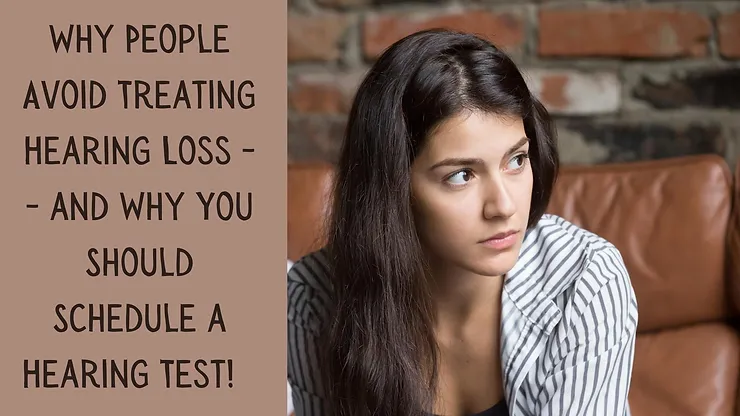
Hearing loss is one of the most common concerns for older Americans. It affects one out of three people by age 65, and two out of three by age 75. While study after study confirms that untreated age-related hearing loss (called “presbycusis”) can lead to a host of associated problems—beyond the normal difficulties we typically associate with hearing loss—it is still vastly undertreated. While 15% of Americans could benefit from hearing aids, only about one in five is currently fitted with them. On average, Americans wait seven years from the time they notice hearing loss to the time they seek treatment.
Hearing Loss Tends to Progress Slowly
Hearing loss typically doesn’t happen all at once. For most people with age-related hearing loss, it has taken years for hearing loss to progress to the point that it becomes problematic. The first thing most people notice in the early stages of mild hearing loss is that conversation becomes more difficult when there is a lot of background noise. Meeting up with friends or family at a busy restaurant, for example, might be harder than it used to be. When this becomes the case, many people start to compensate for their hearing loss by avoiding busy places, sitting closer to people when they talk, and choosing well-lit spaces so they can get more context clues from facial expressions and lipreading. Many people will even disclose their hearing loss and ask a conversational partner to speak louder.
There are many tricks we can use to try to improve communication in the face of hearing loss, and especially when hearing loss is mild (somewhere in the range of 20–40 dBHL of loss) these can be very helpful. The problem is that hearing loss tends to progress, and even mild hearing loss still has an effect on quality of life. People with mild hearing loss, for example, tend to report having more memory issues than those in the same age group with normal hearing. We may get along just fine without hearing aids in the earlier stages of hearing loss, but it’s hard to realize when the problem has become more severe.
Regular Hearing Tests
The Better Hearing Institute, a non-profit organization, recommends getting a hearing test once every decade until age 50, and once every three years thereafter. Those in higher-risk professions or with medical histories indicating a higher risk should be tested even more frequently. By getting regular hearing tests, we can keep track of our hearing health as we go through life. We can have conversations with our audiologist to see whether they recommend hearing aids for us based on our hearing ability and lifestyle. While we may not wish to get hearing aids as soon as we cross the threshold into mild hearing loss, we should not wait too long.
Untreated Hearing Loss Brings Lifestyle Complications
Untreated hearing loss tends to bring with it a host of complications. Just as we start to compensate for our hearing loss with tricks and conversational methods, as our hearing loss progresses we may compensate by avoiding social situations, spending less time outdoors, avoiding travel, and other subtle lifestyle changes that may lead us toward social isolation, depression, and other complications. It’s important that we treat our hearing loss in order to maintain a healthy lifestyle.
Hearing Aids Have Never Been Better
Hearing aids have come a long way in recent decades. They can now function much like a set of Apple Airpods®, connecting to smartphones via Bluetooth. They can favor speech over background noise, and automatically adjust their program as we move through different environments. The tiny, powerful computers that control the digital signal processing (DSP) in our hearing aids have never been better, and the process of adjusting to hearing aids has never been easier. When asked after a year, about 95% of people say they’re glad they got hearing aids.
Assistance With a Significant Investment
One of the major obstacles for many people is money. Hearing aids average more than $4,600 for a pair, yet Medicare and most private insurers do not cover the costs. Considering that the lifespan of a set of hearing aids ranges from about 4–7 years, that is a very significant investment.
Yet treating our hearing loss is one of the best ways to ensure our best long-term health and well-being. For those who are unable to make the investment in cash, there are a number of organizations that can help:
-
Sertoma Club – a national hearing aid recycling organization, they refurbish used hearing aids and distribute them to those in need.
-
Audient or your local Lions Club – both groups help provide new hearing aids at significantly reduced cost.
-
Starkey Hearing Foundation – associated with the Starkey hearing aid company, they help provide new hearing aids for low-income families.
-
Hearing Loss Association of America – check here for a list of additional resources that may provide financial assistance with hearing aids.
If you or a loved one is struggling with hearing loss, make an appointment today and find out if hearing aids are right for you.
